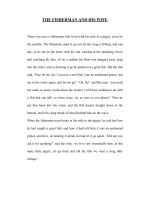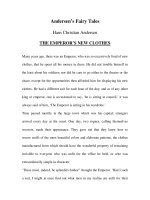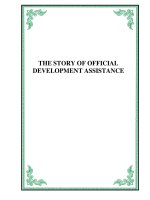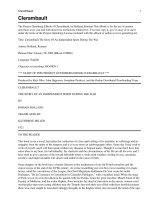THE STORY OF A MOTHER -Andersen’s Fairy Tales
Bạn đang xem bản rút gọn của tài liệu. Xem và tải ngay bản đầy đủ của tài liệu tại đây (22.95 KB, 8 trang )
THE STORY OF A MOTHER
A mother sat there with her little child. She was so downcast, so afraid that it
should die! It was so pale, the small eyes had closed themselves, and it drew
its breath so softly, now and then, with a deep respiration, as if it sighed; and
the mother looked still more sorrowfully on the little creature.
Then a knocking was heard at the door, and in came a poor old man wrapped
up as in a large horse-cloth, for it warms one, and he needed it, as it was the
cold winter season! Everything out-of doors was covered with ice and snow,
and the wind blew so that it cut the face.
As the old man trembled with cold, and the little child slept a moment, the
mother went and poured some ale into a pot and set it on the stove, that it
might be warm for him; the old man sat and rocked the cradle, and the
mother sat down on a chair close by him, and looked at her little sick child
that drew its breath so deep, and raised its little hand.
‘Do you not think that I shall save him?’ said she. ‘Our Lord will not take
him from me!’ 198 of 260 And the old man—it was Death himself—he
nodded so strangely, it could just as well signify yes as no. And the mother
looked down in her lap, and the tears ran down over her cheeks; her head
became so heavy—she had not closed her eyes for three days and nights; and
now she slept, but only for a minute, when she started up and trembled with
cold.
‘What is that?’ said she, and looked on all sides; but the old man was gone,
and her little child was gone—he had taken it with him; and the old clock in
the corner burred, and burred, the great leaden weight ran down to the floor,
bump! and then the clock also stood still.
But the poor mother ran out of the house and cried aloud for her child.
Out there, in the midst of the snow, there sat a woman in long, black clothes;
and she said, ‘Death has been in thy chamber, and I saw him hasten away
with thy little child; he goes faster than the wind, and he never brings back
what he takes!’
‘Oh, only tell me which way he went!’ said the mother. ‘Tell me the way,
and I shall find him!’
‘I know it!’ said the woman in the black clothes. ‘But before I tell it, thou
must first sing for me all the songs thou hast sung for thy child! I am fond of
them. I haveheard them before; I am Night; I saw thy tears whilst thou
sang’st them!’
‘I will sing them all, all!’ said the mother. ‘But do not stop me now—I may
overtake him—I may find my child!’
But Night stood still and mute. Then the mother wrung her hands, sang and
wept, and there were many songs, but yet many more tears; and then Night
said, ‘Go to the right, into the dark pine forest; thither I saw Death take his
way with thy little child!’
The roads crossed each other in the depths of the forest, and she no longer
knew whither she should go! then there stood a thorn-bush; there was neither
leaf nor flower on it, it was also in the cold winter season, and ice-flakes
hung on the branches.
‘Hast thou not seen Death go past with my little child?’ said the mother.
‘Yes,’ said the thorn-bush; ‘but I will not tell thee which way he took, unless
thou wilt first warm me up at thy heart. I am freezing to death; I shall
become a lump of ice!’
And she pressed the thorn-bush to her breast, so firmly, that it might be
thoroughly warmed, and the thorns went right into her flesh, and her blood
flowed in large drops, but the thornbush shot forth fresh green leaves, and
there came flowers on it in the cold winter night, the heart of the afflicted
mother was so warm; and the thorn-bush told her the way she should go.
She then came to a large lake, where there was neither ship nor boat. The
lake was not frozen sufficiently to bear her; neither was it open, nor low
enough that she could wade through it; and across it she must go if she
would find her child! Then she lay down to drink up the lake, and that was
an impossibility for a human being, but the afflicted mother thought that a
miracle might happen nevertheless.
‘Oh, what would I not give to come to my child!’ said the weeping mother;
and she wept still more, and her eyes sunk down in the depths of the waters,
and became two precious pearls; but the water bore her up, as if she sat in a
swing, and she flew in the rocking waves to the shore on the opposite side,
where there stood a mile-broad, strange house, one knew not if it were a
mountain with forests and caverns, or if it were built up; but the poor mother
could not see it; she had wept her eyes out.
‘Where shall I find Death, who took away my little child?’ said she.
‘He has not come here yet!’ said the old grave woman, who was appointed
to look after Death’s great greenhouse! ‘How have you been able to find the
way hither? And who has helped you?’
‘OUR LORD has helped me,’ said she. ‘He is merciful, and you will also be
so! Where shall I find my little child?’
‘Nay, I know not,’ said the woman, ‘and you cannot see! Many flowers and
trees have withered this night; Death will soon come and plant them over
again! You certainly know that every person has his or her life’s tree or
flower, just as everyone happens to be settled; they look like other plants,
but they have pulsations of the heart. Children’s hearts can also beat; go
after yours, perhaps you may know your child’s; but what will you give me
if I tell you what you shall do more?’
‘I have nothing to give,’ said the afflicted mother, ‘but I will go to the
world’s end for you!’
‘Nay, I have nothing to do there!’ said the woman. ‘But you can give me
your long black hair; you know yourself that it is fine, and that I like! You
shall have my white hair instead, and that’s always something!’
‘Do you demand nothing else?’ said she. ‘That I will gladly give you!’ And
she gave her her fine black hair, and got the old woman’s snow-white hair
instead. So they went into Death’s great greenhouse, where flowers and trees
grew strangely into one another. There stood fine hyacinths under glass
bells, and there stood strong-stemmed peonies; there grew water plants,
some so fresh, others half sick, the water-snakes lay down on them, and
black crabs pinched their stalks. There stood beautiful palm-trees, oaks, and
plantains; there stood parsley and flowering thyme: every tree and every
flower had its name; each of them was a human life, the human frame still
lived—one in China, and another in Greenland—round about in the world.
There were large trees in small pots, so that they stood so stunted in growth,
and ready to burst the pots; in other places, there was a little dull flower in
rich mould, with moss round about it, and it was so petted and nursed. But
the distressed mother bent down over all the smallest plants, and heard
within them how the human heart beat; and amongst millions she knew her
child’s.
‘There it is!’ cried she, and stretched her hands out over a little blue crocus,
that hung quite sickly on one side.
‘Don’t touch the flower!’ said the old woman. ‘But place yourself here, and
when Death comes—I expect him every moment—do not let him pluck the
flower up, but threaten him that you will do the same with the others. Then
he will be afraid! He is responsible for them to OUR LORD, and no one
dares to pluck them up before HE gives leave.’
All at once an icy cold rushed through the great hall, and the blind mother
could feel that it was Death that came.
‘How hast thou been able to find thy way hither?’ he asked. ‘How couldst
thou come quicker than I?’
‘I am a mother,’ said she.
And Death stretched out his long hand towards the fine little flower, but she
held her hands fast around his, so tight, and yet afraid that she should touch
one of the leaves. Then Death blew on her hands, and she felt that it was
colder than the cold wind, and her hands fell down powerless.
‘Thou canst not do anything against me!’ said Death.
‘But OUR LORD can!’ said she.
‘I only do His bidding!’ said Death. ‘I am His gardener, I take all His
flowers and trees, and plant them out in the great garden of Paradise, in the
unknown land; but how they grow there, and how it is there I dare not tell
thee.’
‘Give me back my child!’ said the mother, and she wept and prayed. At once
she seized hold of two beautiful flowers close by, with each hand, and cried
out to Death, ‘I will tear all thy flowers off, for I am in despair.’
‘Touch them not!’ said Death. ‘Thou say’st that thou art so unhappy, and
now thou wilt make another mother equally unhappy.’
‘Another mother!’ said the poor woman, and directly let go her hold of both
the flowers.
‘There, thou hast thine eyes,’ said Death; ‘I fished them up from the lake,
they shone so bright; I knew not they were thine. Take them again, they are
now brighter than before; now look down into the deep well close by; I shall
tell thee the names of the two flowers thou wouldst have torn up, and thou
wilt see their whole future life—their whole human existence: and see what
thou wast about to disturb and destroy.’
And she looked down into the well; and it was a happiness to see how the
one became a blessing to the world, to see how much happiness and joy
were felt everywhere. And she saw the other’s life, and it was sorrow and
distress, horror, and wretchedness.
‘Both of them are God’s will!’ said Death.
‘Which of them is Misfortune’s flower and which is that of Happiness?’
asked she. That I will not tell thee,’ said Death; ‘but this thou shalt know
from me, that the one flower was thy own child! it was thy child’s fate thou
saw’st—thy own child’s future life!’
Then the mother screamed with terror, ‘Which of them was my child? Tell it
me! Save the innocent! Save my child from all that misery! Rather take it
away! Take it into God’s kingdom! Forget my tears, forget my prayers, and
all that I have done!’
‘I do not understand thee!’ said Death. ‘Wilt thou have thy child again, or
shall I go with it there, where thou dost not know!’
Then the mother wrung her hands, fell on her knees, and prayed to our Lord:
‘Oh, hear me not when I pray against Thy will, which is the best! hear me
not! hear me not!’
And she bowed her head down in her lap, and Death took her child and went
with it into the unknown land.









